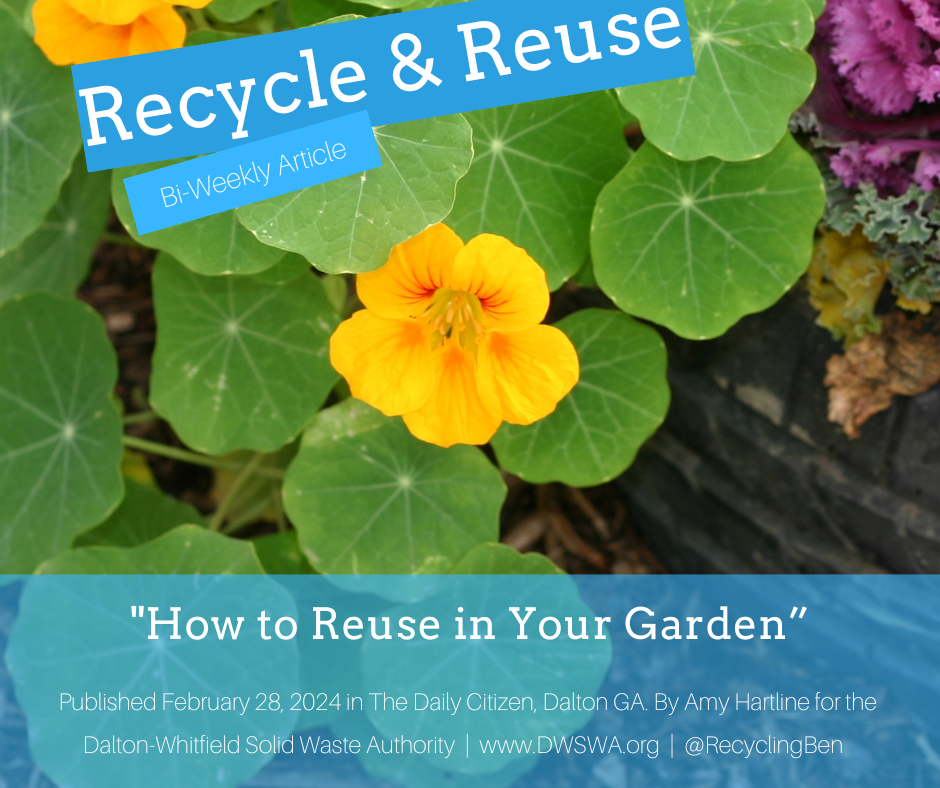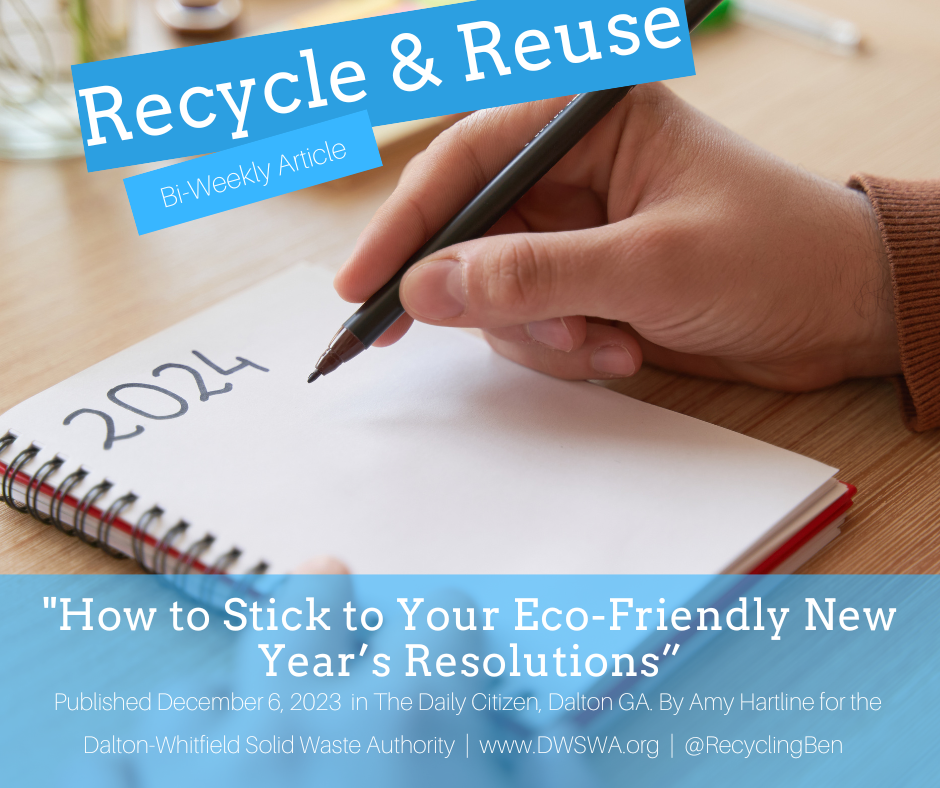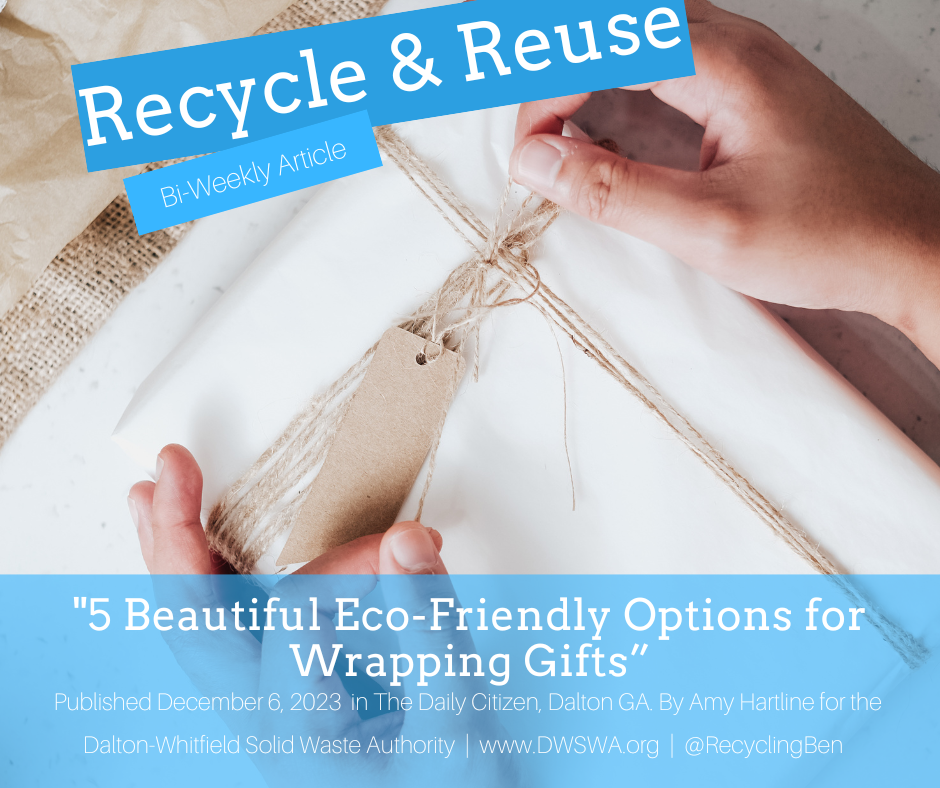16 Green Habits to Start in 2016
/(Published on Wednesday, December 30, 2015, in The Daily Citizen, Dalton, GA.)
Recycle & Reuse: 16 Green Habits to Start in 2016
Set up a recycling area at home to make it easier for the whole family to recyclables.
Here’s a list of sixteen green and eco-friendly habits you can start implementing in 2016. Focus on adding one new habit each month and before you know it you’ll notice that making beneficial choices is second nature.
Use reusable shopping bags instead of single use plastic bags to reduce the amount of waste you make in 2016.
- Eat Locally Grown Produce: Whether it’s from a farmer’s market or even from your own garden, produce that is grown locally has traveled a shorter distance than most produce in the grocery store. By choosing local you support farmers in our community, and you reduce greenhouse gas emissions from transportation.
- Brew Coffee in a French Press: Reduce waste from single-use coffee pods and save electricity when you prepare your coffee in a French Press instead of an electric coffee maker. To reduce even more waste use reusable coffee mugs and insulated travel mugs instead of disposable, single-use cups.
- Recycle Plastic Bags: Plastic shopping bags are great to carry groceries home, but they are designed to be used only one time then thrown away. Instead of throwing them out recycle them at the store where you got them. Most retailers have a recycling bin at the entrance to collect plastic shopping bags.
- Use Reusable Bags: Instead of plastic bags use reusable ones made of cotton or recycled materials. Reusable bags are more sturdy, durable, and colorful than their thin plastic counterparts. Keep them in your car or by the front door so you won’t forget to take them to the store.
- Limit Use of Bottled Water: Plastic water bottles are very convenient, especially in emergency situations where water is not safe to drink. But, for daily use, it’s better to use a reusable water bottle or tumbler to hold water from the tap or a pitcher with a water filter. If you can’t avoid bottled water take the time to recycle the container.
- Pick Up Litter: Help keep our city clean by picking litter (trash in the wrong place) whenever you’re outside – even if it’s not yours. Be a good example to your friends by putting trash in the right place or taking it home when there’s not a trash bin nearby.
- Eliminate Phantom Power: Electricity is used by gadgets and appliances even while you sleep. Unplug chargers for cell phones, tablets, and small devices when not in use. For television sets and game systems use a power strip to shut off everything at once. You could cut your energy bill by as much as ten percent by the end of the year.
- Replace Light Bulbs: As traditional bulbs wear out replace them with more energy-efficient LEDs and CFLs. Compact fluorescent light bulbs convert more energy into light than incandescent bulbs, which produce a lot of heat and waste energy. That can also add up to more savings on your energy bill.
- Recycle Bathroom Products: We tend to recycle more of what’s in the kitchen than the bathroom. Add a small recycling bin to the bathroom to collect plastic bottles, like those for shampoo, and paperboard boxes like those for facial tissue. Learn more about bathroom recycling at www.iwanttoberecycled.org.
- Use Less Paper Towels: Cleaning up spills and wiping down counters with paper towels is wasteful, especially when you consider the high cost of some paper towel brands. Purchase cotton cloths and napkins that can be used and washed with the next load of laundry. Buy the reusable cloths once to replace the tons of paper towels that end up in landfills daily.
- Precycle: Precycling helps us reduce waste before we make it which is a win-win for us and the planet. Before you purchase a product consider whether it’s packaging is recyclable and if there would be a lot of waste left after using the product. You may find an alternative with less packaging or even a way to make your own.
- Use Less Toxic Cleaning Supplies: Make the switch to cleaners with fewer ingredients, those labeled as eco-friendly, or ones that you can make at home. To make cleaning supplies at home you’ll need some basics like baking soda, white vinegar, or borax. Get started with free green cleaning recipes at http://ow.ly/ge2CV which links to Women’s Voices for the Earth.
- Bike or Walk More: Depending on where you live, you may be able to walk or ride a bicycle to the park, to a store, or to work. Using your bicycle instead of the car for trips that are two miles or less away from your home will save money on gas, vehicle maintenance, and even help you stay fit.
- Compost: Make this beneficial soil amendment at home by mixing food and paper scraps, and yard trimmings. Over time they will decompose into a nutritious hummus that can be added to your garden, potted plants, or soil. Visit the US Composting Council at www.compostingcouncil.org to get started.
- Go Outdoors: Make a habit to spend more time outside by taking a walk once a week. The more time we spend in nature the more likely we are to make choices that are beneficial to conserving the environment.
- Make a Recycling Area: Use two or more cardboard boxes, bins, or reusable shopping bags to pre-sort materials. For example, one container can be for paper, while another can be for plastic bottles and jugs. Label the container so everyone knows what types of items to add.
Liz Swafford is the Recycling and Education Program Coordinator for the Dalton-Whitfield Solid Waste Authority. Have questions about recycling in Whitfield County? Call 706-278-5001, or e-mail lswafford@dwswa.org.

































